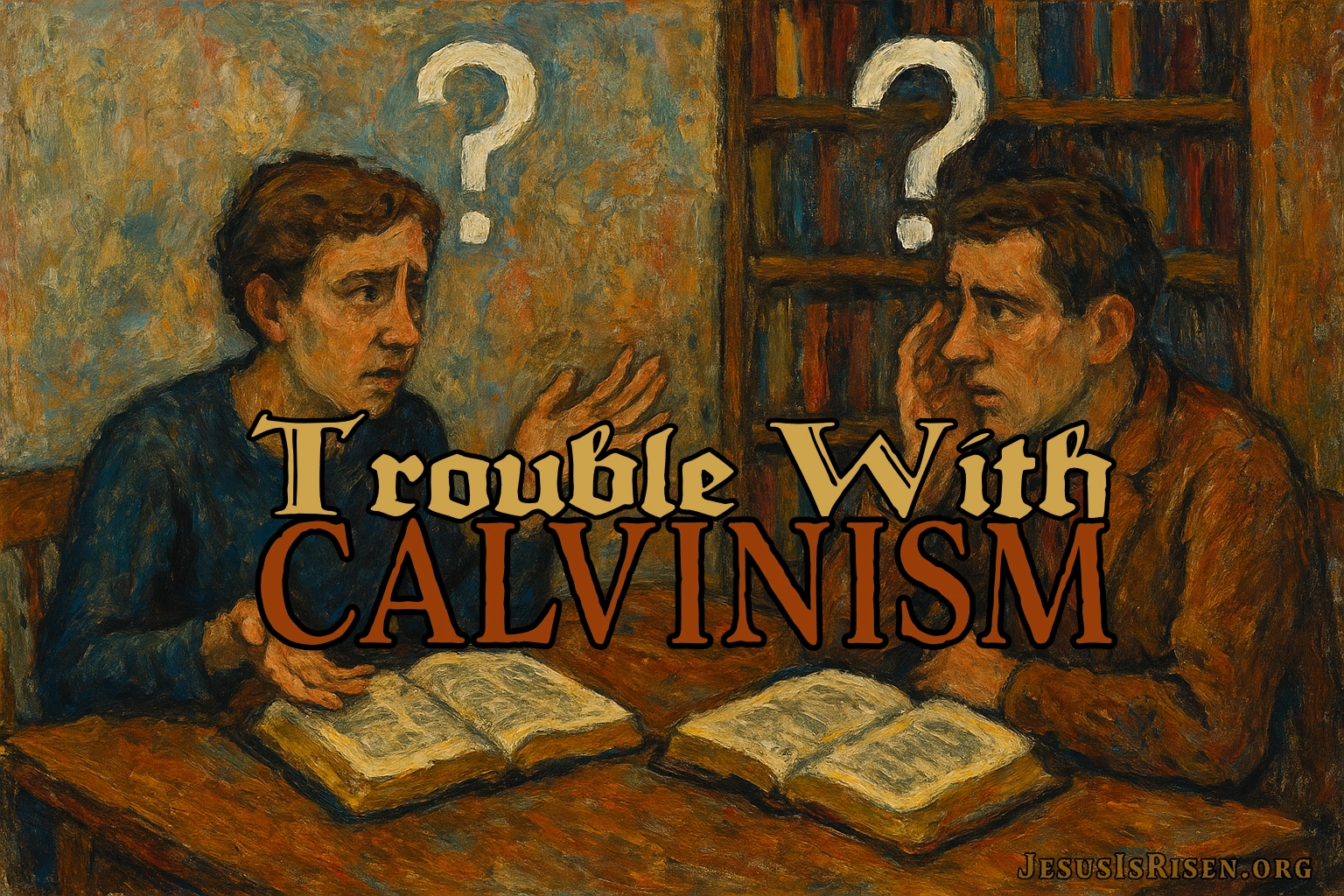Trouble with Calvinism: Why Many Struggle with Reformed Theology
If Based On Scripture, Why Doesn’t Everyone See it?
As with many of my articles, this one started out as a reply to a question on Facebook. The Reformed Sage asked:
If Reformed Theology is so scripturally rooted, why do you think so many struggle to accept its doctrines?
What are your thoughts?
While I know most of my readers are Calvinists, some are not. I think this is an important question to tackle. If you’re not a Calvinist, this article is for you, too. It’s not a sales pitch or a conversion attempt—it’s my perspective as someone who grew up Wesleyan Arminian and didn’t become a Calvinist until I was 30. My aim is to foster understanding and edify, wherever you stand.
As an aside: While Calvinism and Reformed Theology aren’t technically identical—a topic I discuss in Leaving Calvinism’s Parking Lot—Reformed Theology necessarily includes Calvinism, and the terms are used interchangeably in this article for simplicity.
Why So Many Struggle With Reformed Theology
Because we conflate what we experience with the means.
I know what it was like to make a decision to believe in Jesus Christ. I know I believed. I know that’s when I first became a Christian. But what I didn’t understand, what I wasn’t taught in church, and what I didn’t learn for three decades, is that my belief was only possible because God willed it, granted it, and worked it in me (John 6:44; Philippians 2:13; Ephesians 2:8–9, LSB).
You don’t need to understand the mechanism by which you believe—God’s only demand is that we believe (John 6:29, LSB). But the mechanism matters. It’s all grace. It’s all a gift. Some God gives more than others, according to His good pleasure (Romans 12:3; 1 Corinthians 4:7; Ephesians 1:5, LSB). I don’t know why God let me understand. I was prideful, boasting that if I really wanted to, I could turn away from God. I wouldn’t—but I could, if I wanted to. Such wicked thoughts for someone who calls Jesus Lord (Romans 9:15–16; John 15:16, LSB).
Yet in spite of myself, God put patient, gracious, and longsuffering people in my life. They answered my questions, challenged my presuppositions, and refused to give up on me, no matter how insufferable I was. God graciously beat down my pride, until I finally yielded: He is God, and I am not (Job 40:8–14; Romans 9:20–21, LSB). He chose me—I did not choose Him (John 15:16; Romans 8:29–30, LSB).
Doctrinal Blind Spots in American Churches
In much of American evangelicalism, certain doctrines aren’t even presented as doctrines—they’re simply the biblical view. When you’re never shown that alternative, historic views even exist, you’re not choosing your theology—you’re just inheriting it by default. That’s not conviction. That’s inertia.
For example, I didn’t even know Reformed Theology and Calvinism existed until I was 29 or 30 years old. I remember it was once briefly discussed in Wednesday night church in my early teens, but it was in the context of an historical belief nobody really believed anymore. I didn’t know there were other views of eschatology besides “pre-trib, mid-trib, and post-trib premillennialism” until even later! These are just a few examples within Protestantism—don’t get me started on historic Christian orthodoxy. So, when someone shows us there’s another way—one with centuries, even millennia, of faithful witness—we instinctively go on the defensive.
That reflex isn’t bad in itself. It’s wise to test new ideas (1 John 4:1; Acts 17:11, LSB). But it becomes a problem when we’re so defensive that we refuse to even think it through. Even with outright heresy, we should at least follow it to its logical conclusion—understand it as its adherents do—before we judge (Proverbs 18:13, LSB). But we don’t do that. Not for Calvinists, not for Muslims, not for Catholics. Instead, we caricature what others believe, plug our ears, and shout “la-la-la-la!” like children.
Understanding Your Opponent
This willful ignorance doesn’t just make us poor apologists—it harms the gospel. Scripture shows Jesus and the apostles reasoning with the Jews in the synagogues (Jesus: Luke 4:16–30; Mark 1:21; Mark 6:2; John 18:20. Apostles: Acts 17:2–3; Acts 18:4, LSB), and Paul engaging the Athenians on Mars Hill. There, he even quotes pagan philosophers to reach them with the truth:
“for in Him we live and move and exist, as even some of your own poets have said, ‘For we also are His offspring.’” —Acts 17:28, LSB
Here, Paul references Epimenides of Crete (“in Him we live and move and exist”) and Aratus or Cleanthes (“For we also are His offspring”).
Paul does this elsewhere as well:
- In 1 Corinthians 15:33, he writes:“Do not be deceived: ‘Bad company corrupts good morals.’” This is a quotation from the Greek poet Menander.
- In Titus 1:12, he says:“One of them, a prophet of their own, said, ‘Cretans are always liars, evil beasts, lazy gluttons.’” This cites Epimenides of Crete—a pagan poet.
They didn’t fear honest engagement—they confronted error at the point of disagreement and refused to straw man their opponents (1 Peter 3:15, LSB). This is the biblical pattern: listen, engage, and reason from the Scriptures—even when the disagreement runs deep.
This is a failure still rampant in American Christianity—and even among those of us in the Reformed camp. If our theology is as rooted in Scripture as we claim, we should have nothing to fear from honest, rigorous engagement. We should be the first to listen, to think deeply, and to reason from the Scriptures, not just recite slogans (Acts 17:11; 2 Timothy 2:15, LSB).
If You Value My Thoughts In One Area…
The turning point for me in understanding Reformed Theology came when I realized all of the pastors and podcasts I was listening to were by Calvinists: James White, Apologia Radio, R.C. Sproul, John Piper, and more. I loved how faithful they were in handling Scripture in other areas. I had grown tired with how flippant other apologists and preachers were handling God’s word. I valued the faithful approach to social issues, politics, and every other area of doctrine these Calvinists were. But this Calvinism? Yuck. I used to skip every episode or section when they breached the topic.
At some point, I realized what I was doing. I was telling them what their beliefs meant. I told them what the conclusion was. I valued how they came to the conclusions on everything else, but when it came to Calvinism, I wouldn’t even listen. I was too busy telling them why they were wrong.
To be clear, I didn’t surrender the debate. I realized, I was being unfair in how I was debating the position. If I respected them in all those other areas, and they were faithful and smart men of God, then if they came to a different conclusion on Calvinism than me, I needed to at the very least, understand why and how they came to those conclusions. That’s when I actually began to understand their arguments and why they believe the way they believe.
If you value my opinion on social issues, on theology, if you believe I’m a faithful man of God, then all I ask is you hear me out on this issue as well. Not to believe me, but to just listen without letting your own assumptions interject. This is the same strategy I use when addressing Muslims, when addressing Mormons, and Atheists. I haven’t become a Muslim, a Mormon, or an Atheist—but I have become a Calvinist.
If Scripture is your standard, don’t fear following the argument wherever it leads. Listen, weigh, and ask if what you’ve inherited truly fits what God’s word teaches.
Conclusion
We have nothing apart from the grace of God. None of us deserves salvation—we all deserve hell. The salvation of God is not a reward earned, but a gift given freely by God’s will, for His own purposes (Eph 1:19; 2:1–9). We have faith only because the Holy Spirit makes our dead hearts alive in Christ. Only then are we able to seek God where we once despised Him (Rom 3:10–18).
For those of us who are Reformed, it’s essential that we show grace and patience—even to the most obstinate. And for those who are not Calvinists, not Reformed, please be patient with us; we too are far from perfected. We all struggle with pride, arrogance, and frustration. But what matters is that Christ is Lord and Savior, who died for us and calls us to love one another because He first loved us. That must be our common ground.
Liked what you read? Subscribe for free.
Never miss out — Be notified of my latest articles!





